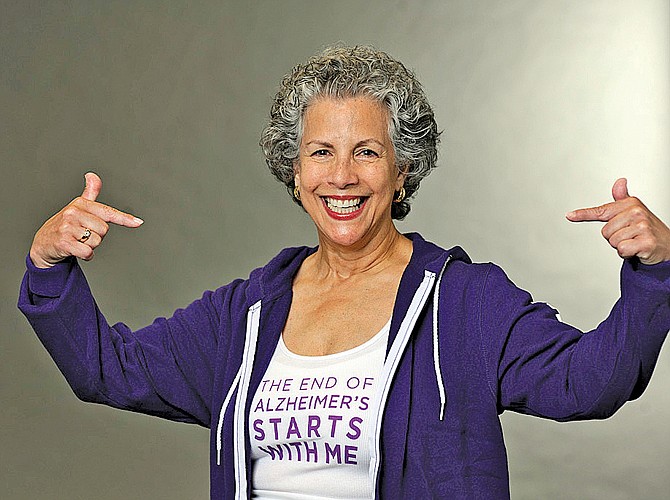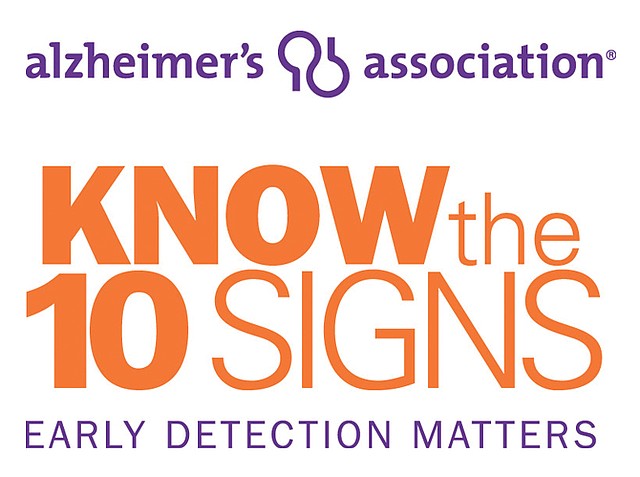Myriam Marquez - A Warrior Against Alzheimer’s
October 30, 2012 at 12:22 p.m.
By the time she’d reached 60, Myriam Marquez was convinced she’d dodged a bullet and that the family legacy had skipped her somehow. Her father had started to show signs of memory loss and other cognitive impairment in his early 40s. So did five of her uncles. They all died in their early 50s. She’s the fifth oldest of her cousins and two are currently in the end stages of younger-onset Alzheimer’s. For Myriam, there’s no question that Alzheimer’s disease (AD) runs in her family.
But something changed one evening while driving home from Mount Vernon where she worked as an attorney. Marquez came to the same four-way stop she’d always crossed in Stanwood, but the intersection looked unfamiliar. She was lost despite having daily driven this way home. That was in March of 2009.
“I came to that stop and all of the sudden I didn’t know where I was,” Marquez remembers. “I panicked.” She called her daughter from her cell phone. But as she was talking she realized where she was and said, “Never mind. I know where I am.” Myriam made a right hand turn and went home.
The next week she went to her doctor, concerned that something was wrong. The doctor ran a battery of tests - PET scan, MRI, memory tests, and blood work – and they all came back negative.
Relieved but with a heightened awareness, a memory lapse at a family Thanksgiving gathering prompted added concern. While getting ready to leave her daughter’s house, Marquez went to grab the doorknob and she didn’t know where she was or where she was going.
“The next week I went to my doctor and I said ‘I know I’ve got it,’ ” Marquez shared.
That’s when the doctor suggested that DNA testing was the only way to confirm Myriam’s suspicions. In April 2010, the tests came back positive. Myriam was 62-years-old and diagnosed with younger-onset Alzheimer’s. Marquez possesses the Puerto Rican mutation of the Presenilin 1 gene, one of the four genes that are known to cause AD with clusters found predominately in Puerto Rico, New York, and Hawaii.
Younger-onset Alzheimer’s distinguishes itself from later-onset Alzheimer's in that symptoms start to manifest before a person reaches 65. Younger-onset is estimated to affect 5 to 10 percent of all Alzheimer’s cases.
Lifestyle choices are something Marquez believes delayed the advancement of her Alzheimer’s, a progressive and fatal disease. “I went to college, to law school. I used my brain a lot in my practice of law. I’m also an actress. And I’ve stayed physically active. I’ve worked out most of my life and am socially active. I also try to eat a Mediterranean diet. It’s my belief that that’s the reason why mine was delayed.”
With her diagnosis, she decided to leave law and become an advocate for the Alzheimer's Association, redirecting her focus to being a voice for other individuals and families affected by Alzheimer’s. She also travels frequently, having visited India for a month and then on to Peru. “Just doing things I’ve always wanted to do,” she explains.
Since then, she has become very active inside the Alzheimer’s Association. She serves on the regional chapter's board of directors, as a national Association and Chapter early stage advisor, acts as a peer-to-peer advisor, and has marched on Capitol Hill in Washington, D.C. to spread awareness and encourage increased funding for research. She also regularly participates in an early stage memory loss support group. Her success within the association is something she attributes to her years of practicing law. She also participates as a research subject in the Dominantly Inherited Alzheimer’s Network (DIAN) clinical trials studies at UCLA.
In May of 2012, the National Institutes of Health released a plan to aid the fight against Alzheimer's. In January 2011, President Barack Obama signed the National Alzheimer’s Project Act (NAPA) into law, allocating a $100 million increase for support of AD research, public awareness, provider education programs, caregiver support, and data collection. “This is a good start,” according to Bob Le Roy, president and CEO of the Alzheimer’s Association Western and Central Washington State Chapter. “Studies have shown that here is a direct correlation between the amount of money you put into research and finding a cure or treatments that will stop progression. Research into heart disease, HIV, breast cancer are all strong examples of that. We need more public awareness and more research funding to address what has become a public health epidemic. And individuals like Myriam are a powerful example of how we can make that happen. She’s a voice, an advocate, an Alzheimer’s champion. She a large part of how NAPA happened! And her willingness to share her story and to continue fighting helps others to overcome the stigma of Alzheimer’s and recognize that although you have Alzheimer’s, there is still a lot of living to do.”
For Marquez, the choice to give up law and fight for a cure was never a difficult one to make.
“I am a warrior against Alzheimer’s. Most of my time is spent doing everything I can to find a cure or stop the progression of this devastating disease. I’m doing it partly for myself, but mostly for my children and grandchildren.”
Alzheimer’s disease (AD) is the sixth leading cause of death in the United States. Currently, 5.4 million Americans--including nearly 150,000 here in Washington State--are living with Alzheimer’s or a related dementia. Each of these individuals is being cared for by, on average, three caregivers, the vast majority of whom are unpaid. By 2050, these numbers will more than triple, and the overall annual cost of Alzheimer’s and other dementias to government, businesses, individuals, and families will exceed $1 trillion.
The Alzheimer’s Association – bringing help and hope to individuals and families affected by Alzheimer’s and other dementias. Offering information, resources, support groups, care consultation, a 24/7 Helpline, and education, all free-of-charge. 206-363-5500. www.alzwa.org. 24/7 Helpline: 1-800-272-3900.
Additional resource, clinical trial, and other information:
• Alzheimer’s Association - Early Stage Memory Loss Program 206.529.3868 or asouza@alz.org
• University of Washington Alzheimer’s Disease Research Center - To participate in a clinical study or trial, visit www.uwadrc.org or call 1-800-317-5382.
• Frye Art Museum offers an arts-enrichment program for individuals living with dementia and their care partners to enjoy a creative and relaxing afternoon together: visit fryemuseum.org or call 206-432-8265.
• Greenwood Senior Center’s Alzheimer’s Café provides an opportunity for people living with Alzheimer’s disease or other dementias and their care partners to socialize in a safe environment with others. 2nd Tuesday of each month, 3:30-5 pm at Mae’s Phinney Ridge Café, 6412 Phinney Ave. N., Seattle. No reservations necessary; the only cost is your dessert and drink. For information call Carin at 206-297-0875 or visit www.greenwoodseniorcenter.org
This article appeared in the November 2012 issue of Northwest Prime Time, the Puget Sound region’s monthly publication celebrating life after 50.
How to manage stress: 10 ways to be a healthier Alzheimer’s caregiver
Are you so overwhelmed by taking care of someone else that you have neglected your own physical, mental and emotional well-being? If you find yourself without the time to take care of your own needs, you may be putting yourself and your health at risk.
Understand what’s going on as early as possible. Symptoms of Alzheimer’s may appear gradually. It can be easy to explain away changing or unusual behavior when a loved one seems physically healthy. Instead, consult a doctor when you see changes in memory, mood or behavior. Don’t delay; some symptoms are treatable.
Know what community resources are available. Contact your local Alzheimer’s Association office. The staff can help you find Alzheimer care resources in your community. Adult day programs, in-home assistance, visiting nurses and meal delivery are just some of the services that can help you manage daily tasks.
Become an educated caregiver. As the disease progresses, new caregiving skills may be necessary. The Alzheimer’s Association offers programs to help you better understand and cope with the behaviors and personality changes that often accompany Alzheimer’s.
Get help. Trying to do everything by yourself will leave you exhausted. Seek the support of family, friends and community resources. Tell others exactly what they can do to help. The Alzheimer’s Association 24/7 Helpline, online message boards and local support groups are good sources of comfort and reassurance. If stress becomes overwhelming, seek professional help.
Take care of yourself. Watch your diet, exercise and get plenty of rest. Making sure that you stay healthy will help you be a better caregiver.
Manage your level of stress. Stress can cause physical problems (blurred vision, stomach irritation, high blood pressure) and changes in behavior (irritability, lack of concentration, change in appetite). Note your symptoms. Use relaxation techniques that work for you, and talk to your doctor.
Accept changes as they occur. People with Alzheimer’s change and so do their needs. They may require care beyond what you can provide on your own. Becoming aware of community resources – from home care services to residential care – should make the transition easier. So will the support and assistance of those around you.
Make legal and financial plans. Plan ahead. Consult a professional to discuss legal and financial issues including advance directives, wills, estate planning, housing issues and long- term care planning. Involve the person with Alzheimer’s and family members whenever possible.
Give yourself credit, not guilt. Know that the care you provide does make a difference and you are doing the best you can. You may feel guilty because you can’t do more, but individual care needs change as Alzheimer’s progresses. You can’t promise how care will be delivered, but you can make sure that the person with Alzheimer’s is well cared for and safe.
Visit your doctor regularly. Take time to get regular checkups, and be aware of what your body is telling you. Pay attention to any exhaustion, stress, sleeplessness or changes in appetite or behavior. Ignoring symptoms can cause your physical and mental health to decline.
For additional support, resources, and workshops, contact the Alzheimer’s Association’s 24/7 Helpline at 800.272.3900 or visit www.alzwa.org
Know the 10 Warning Signs of Alzheimer’s: Early Detection Matters
From the Alzheimer’s Association
Memory loss that disrupts everyday life is not a normal part of aging. It may be a sign of Alzheimer's disease, which causes changes in thinking, reasoning and behavior. Although the disease is more common in people 65 and older, it can also strike those in their 30s, 40s and 50s.
This list of 10 warning signs of Alzheimer’s can help you understand if your memory loss is a serious health concern. If you notice any of these signs in yourself or someone you know, don't ignore them. See your doctor for a check-up. There are other conditions, some that are treatable, that could be causing the signs.
Early diagnosis gives you a chance to seek treatment and plan for the future. If you have questions, call the Alzheimer’s Association anytime at 800.272.3900.
Memory changes that disrupt daily life
One of the most common signs of Alzheimer's is memory loss, especially forgetting recently learned information. Others include forgetting important dates or events; asking for the same information over and over; relying on memory aides (e.g., reminder notes or electronic devices) or family members for things they used to handle on their own.
What's a typical age-related change? Sometimes forgetting names or appointments, but remembering them later.
Challenges in planning or solving problems
Some people may experience changes in their ability to develop and follow a plan or work with numbers. They may have trouble following a familiar recipe or keeping track of monthly bills. They may have difficulty concentrating and take much longer to do things than they did before.
What's a typical age-related change? Making occasional errors when balancing a checkbook.
Difficulty completing familiar tasks at home, work or leisure
People with Alzheimer's often find it hard to complete daily tasks. Sometimes, people may have trouble driving to a familiar location, managing a budget at work or remembering the rules of a favorite game. What's a typical age-related change? Occasionally needing help to use the settings on a microwave or to record a television show.
Confusion with time or place
People with Alzheimer's can lose track of dates, seasons and the passage of time. They may have trouble understanding something if it is not happening immediately. Sometimes they may forget where they are or how they got there. What's a typical age-related change? Getting confused about the day of the week but figuring it out later.
Trouble understanding visual images and spatial relationships
For some people, having vision problems is a sign of Alzheimer's. They may have difficulty reading, judging distance and determining color or contrast. In terms of perception, they may pass a mirror and think someone else is in the room. They may not realize they are the person in the mirror. What's a typical age-related change? Vision changes related to cataracts.
New problems with words in speaking or writing
People with Alzheimer's may have trouble following or joining a conversation. They may stop in the middle of a conversation and have no idea how to continue or they may repeat themselves. They may struggle with vocabulary, have problems finding the right word or call things by the wrong name (e.g., calling a "watch" a "hand-clock"). What's a typical age-related change? Sometimes having trouble finding the right word.
Misplacing things and losing the ability to retrace steps
A person with Alzheimer's disease may put things in unusual places. They may lose things and be unable to go back over their steps to find them again. Sometimes, they may accuse others of stealing. This may occur more frequently over time. What's a typical age-related change? Misplacing things from time to time, such as a pair of glasses or the remote control.
Decreased or poor judgment
People with Alzheimer's may experience changes in judgment or decision-making. For example, they may use poor judgment when dealing with money, giving large amounts to telemarketers. They may pay less attention to grooming or keeping themselves clean. What's a typical age-related change? Making a bad decision once in a while.
Withdrawal from work or social activities
A person with Alzheimer's may start to remove themselves from hobbies, social activities, work projects or sports. They may have trouble keeping up with a favorite sports team or remembering how to complete a favorite hobby. They may also avoid being social because of the changes they have experienced. What's a typical age-related change? Sometimes feeling weary of work, family and social obligations.
Changes in mood and personality
The mood and personalities of people with Alzheimer's can change. They can become confused, suspicious, depressed, fearful or anxious. They may be easily upset at home, at work, with friends or in places where they are out of their comfort zone. What's a typical age-related change? Developing very specific ways of doing things and becoming irritable when a routine is disrupted.
For more information about the 10 warning signs and early detection and diagnosis, contact the Alzheimer’s Association, Western and Central Washington State Chapter at 800.272.3900 or visit www.alzwa.org.







